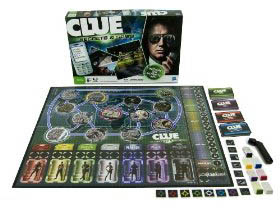Clue Secrets and Spies
Six agents with one mission: stop Agent Black - decode secret messages and get text messages on your phone
 Prove yourself as the world's ultimate spy. Stop the notorious plotting Agent Black. Go undercover as an international agent to foil his schemes by completing missions and attending secret meetings. While you are undercover, use your smarts, your spy light and even your cell phone to become the top agent. Check your cell phone for a spy text that could help or hinder your game. Your assignments will take you all over the world, so stay ahead of the other agents.
Prove yourself as the world's ultimate spy. Stop the notorious plotting Agent Black. Go undercover as an international agent to foil his schemes by completing missions and attending secret meetings. While you are undercover, use your smarts, your spy light and even your cell phone to become the top agent. Check your cell phone for a spy text that could help or hinder your game. Your assignments will take you all over the world, so stay ahead of the other agents.
Children's fascination with playing as spies stems from a combination of imaginative play, curiosity, and the allure of secrecy. This role-playing activity allows them to explore different aspects of the world around them and experience a sense of adventure and mystery. Here are several reasons why children enjoy playing as spies:
- Sense of Adventure: Playing as spies allows children to step into the shoes of secret agents on daring missions. The idea of embarking on covert operations, solving puzzles, and uncovering hidden truths adds an element of excitement and adventure to their playtime.
- Imaginative Exploration: The spy theme encourages children to use their imagination to create elaborate scenarios, characters, and settings. They can invent their own spy gadgets, come up with secret identities, and design intricate espionage plots, fostering creative thinking and storytelling skills.
- Role Reversal: Children often enjoy the idea of taking on roles that differ from their everyday lives. Playing as spies allows them to step into the shoes of confident and capable characters who are skilled in problem-solving and quick thinking.
- Mystery and Problem-Solving: Spy play involves solving puzzles, decoding messages, and piecing together clues. Children find satisfaction in using their analytical skills to unravel mysteries and overcome challenges, promoting cognitive development and critical thinking.
- Empowerment: Being a spy gives children a sense of empowerment and control over their imaginary world. They can navigate situations, make decisions, and face obstacles, which contributes to their self-confidence and decision-making abilities.
- Social Interaction: Spy play often involves teamwork and collaboration, as children work together to complete missions, share information, and achieve common goals. This fosters social skills, communication, and cooperation among peers.
- Secrecy and Privacy: The concept of secrecy appeals to children's fascination with hidden information and codes. The idea of having secret messages, invisible ink, and hidden compartments adds an element of intrigue to their playtime.
- Use of Props: Spy play often involves using props such as disguises, invisible ink pens, walkie-talkies, and binoculars. These props enhance the immersive experience and allow children to interact with their environment in unique ways.
- Admiration of Spy Characters: Many children are exposed to spy characters in movies, books, and media. These characters often possess special skills, confidence, and a cool demeanor, which children find captivating and seek to emulate in their play.
Children enjoy playing as spies because it provides them with an opportunity to engage in imaginative and adventurous play, solve mysteries, exercise creative thinking, and collaborate with others. The spy theme appeals to their curiosity, desire for empowerment, and admiration for fictional spy characters, making spy play a source of excitement, learning, and social interaction.
